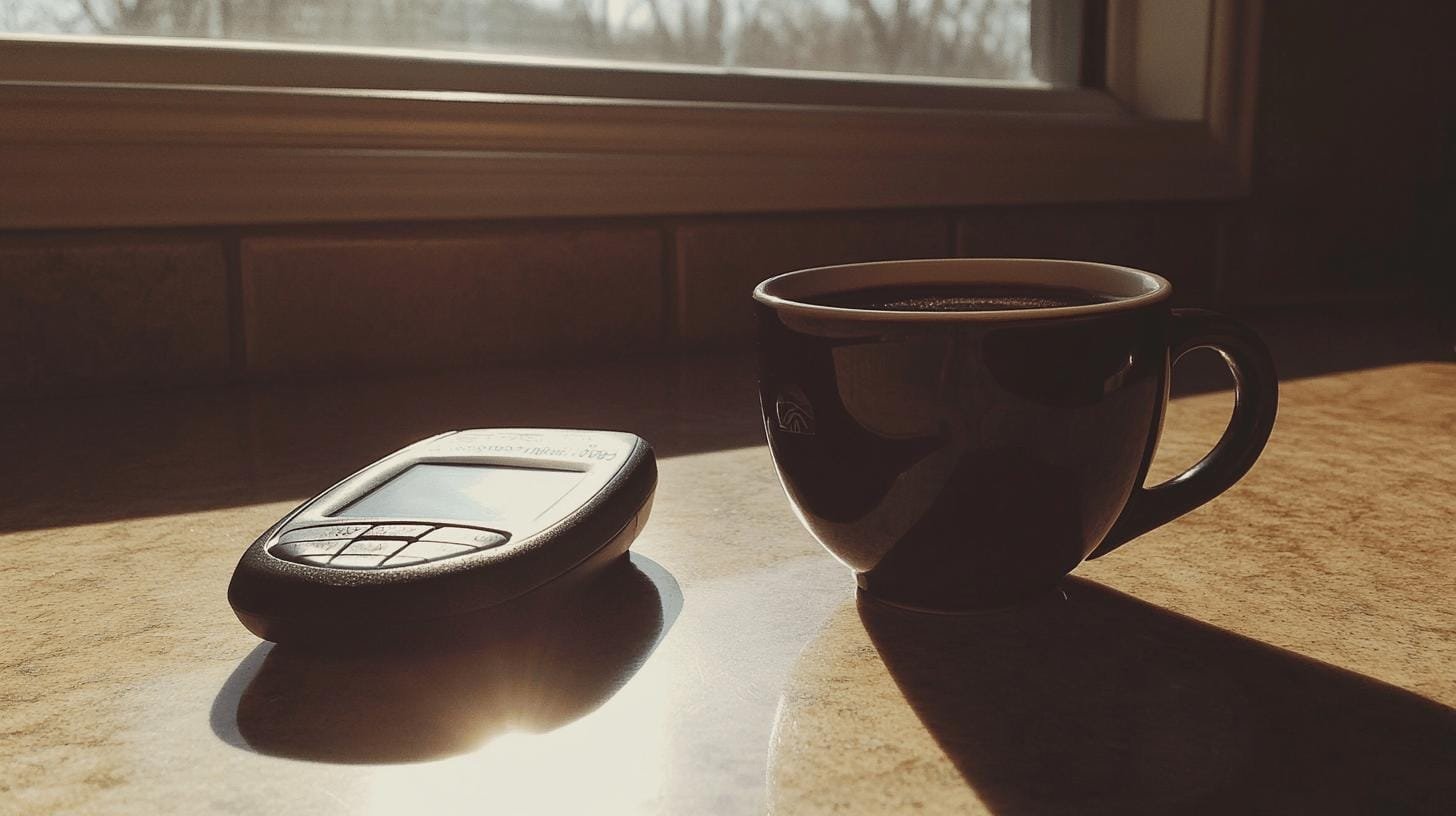
Community-Building Strategies for Independent Coffee Shops (That Actually Work)
Introduction Independent cafes win when they feel like the neighborhood’s living room and operate with the discipline of a great kitchen. Below is a quick

Can coffee be both a bitter brew and a sweet remedy for managing diabetes? This provocative question reflects the complex relationship between coffee and diabetes management. Research presents a tapestry of findings: coffee may lower the risk of developing type 2 diabetes, yet it can simultaneously influence blood glucose levels, sometimes leading to unexpected spikes. By exploring the intricate dance between coffee compounds and diabetes control, we delve into both potential health benefits and risks. Understanding these dynamics can empower individuals to make informed decisions about their coffee consumption and diabetes management.
Coffee has a complex relationship with diabetes. It affects blood sugar levels and insulin sensitivity, but this impact varies among people. For some, it might raise blood sugar levels, especially for those with diabetes. Caffeine can change how insulin works and how the body processes sugar. Yet, coffee is also linked with a lower risk of developing type 2 diabetes. Experts are still studying its varied effects on blood sugar and insulin sensitivity.
The potential benefits of coffee, mainly in diabetes prevention, are significant. Research shows a link between drinking more coffee and a lower risk of type 2 diabetes. Thanks to antioxidants and polyphenols in coffee, drinking it may reduce inflammation and improve metabolism. Interestingly, both caffeinated and decaffeinated coffee offer similar benefits, showing that components other than caffeine play a role.
However, risks exist for those with diabetes. Some might benefit from coffee, but others can experience issues like altered insulin sensitivity and sugar spikes. Individual tolerance and additional health conditions can influence these effects. Also, coffee might interfere with some diabetes medications, adding complexity. Personalized advice and monitoring are crucial when considering coffee’s effects on diabetes.

Caffeine changes blood sugar by affecting insulin sensitivity. It can trigger adrenaline release, prompting the liver to release more glucose. This can temporarily spike blood sugar, especially shortly after drinking coffee. It also reduces how effectively the body uses insulin, affecting sugar metabolism. These changes are usually short-term but show caffeine’s complex role in blood sugar control.
Individual differences like caffeine sensitivity, genetics, and health status cause varied responses. Compounds in coffee, like polyphenols and chlorogenic acids, also affect blood sugar. These may offer protective effects, altering the body’s response to coffee. So, some might have sugar spikes, while others see little change or even benefits.
Factors influencing coffee’s impact on blood sugar:
Studies reveal that coffee may reduce the risk of type 2 diabetes by up to 7% per cup. This suggests that regular coffee drinking may lower the disease’s incidence. Both caffeinated and decaf types have shown protective effects, indicating factors beyond caffeine are involved. These findings position coffee as a beneficial element for reducing diabetes risk.
Coffee’s protective benefits may link to its rich antioxidants and polyphenols. These compounds fight inflammation and support metabolic health, key in managing diabetes. Coffee’s antioxidants combat oxidative stress, which can worsen insulin resistance. Meanwhile, polyphenols could improve metabolism and insulin use, aiding better blood sugar control. Together, these compounds position coffee as a beneficial drink for diabetes prevention.

Coffee can vary blood sugar levels, especially in type 2 diabetes patients. Some might see spikes as caffeine reduces insulin sensitivity, causing higher sugar levels and greater insulin needs. Responses vary widely, so personalized advice is crucial in diabetic management.
Coffee can interfere with diabetes medications, complicating sugar management. It might affect medicine absorption and effectiveness. For example, it can delay oral diabetes medicines, impacting sugar control. Diabetic patients should discuss coffee intake with healthcare providers.
High coffee consumption can raise heart rate and blood pressure, which is risky for diabetics. They often have a higher heart disease risk, and too much caffeine can worsen this. Balancing coffee intake can help reduce cardiovascular risks.
Precautions for diabetic patients:
Home-roasting lets users control roasting levels, affecting coffee’s health benefits. Adjusting the roast can change antioxidant levels, improving health factors crucial for diabetes management. Customizing coffee makes home-roasted beans a flexible option for those concerned about sugar control.
Freshness maximizes flavor and health benefits. Home-roasting ensures fresh coffee, retaining antioxidants that decline over time. Different roasting methods can change caffeine levels, offering lower caffeine options if needed. This makes home-roasted coffee a better choice for managing diabetes.
Benefits of home-roasting:
Understanding the coffee effect on diabetes reveals a complex interplay between potential benefits and risks. Coffee, with its antioxidants and polyphenols, offers a promising reduction in type 2 diabetes risk, underscoring its preventive potential. Conversely, individual responses to coffee, particularly concerning blood sugar and insulin sensitivity, necessitate cautious consumption, especially for those with existing diabetes.
Coffee remains a beverage of considerable interest for its health implications, presenting both opportunities and considerations in diabetes management. By staying informed about its effects, one can navigate the balance, ultimately fostering a nuanced appreciation of coffee’s role in diabetes care.
Black coffee may offer benefits like potential reduced risk of type 2 diabetes and antioxidants. However, effects vary, and monitoring blood sugar responses is crucial for effective management.
Diabetics can drink coffee with milk, but should consider milk’s carbohydrate content, which might affect blood sugar levels. Individual sensitivity and preferences should guide consumption.
Coffee can be consumed with diabetes, but individual tolerance varies. Monitoring blood glucose is necessary due to potential blood sugar spikes or declines.
Coffee consumption may affect insulin sensitivity, leading to increased insulin requirements in some cases. Individual responses can vary significantly.
The choice between tea and coffee depends on personal blood sugar responses and caffeine tolerance. Both can fit into a diabetes management plan with careful monitoring.

Introduction Independent cafes win when they feel like the neighborhood’s living room and operate with the discipline of a great kitchen. Below is a quick

Discover how top specialty coffee brands create lasting loyalty through storytelling, sourcing, and community connection. Real tips from 6 industry experts.

Discover the ultimate showdown between two beloved coffee brewing methods: the French press and Chemex. Explore how each technique caters to distinct palates, with the French press delivering bold flavors and the Chemex presenting a bright, clean taste.

Unlock the secrets to brewing the perfect cup of coffee with our comprehensive guide on using a coffee scale. Discover how precise measurements enhance flavor and consistency while eliminating bitterness.

Discover how water temperature plays a vital role in brewing the perfect cup of coffee. This article delves into the ideal temperature range of 195°F to 205°F for optimal flavor extraction, enhancing the enjoyment of high-quality beans.

Discover the world of curated specialty coffee bundles, perfect for enthusiasts seeking quality and craftsmanship. This article explores the benefits of ethically sourced, small-batch beans from brands like Equipoise Coffee, offering diverse flavor profiles that elevate your brewing experience.

Discover the art of manual brewing to elevate your coffee experience! This article explores various techniques like pour-over, French press, and AeroPress, revealing how they enhance flavor and your connection to every cup.

Discover how to balance productivity and rest with the perfect cup of coffee. This article explores the art of brewing high-quality coffee to enhance your work routine while promoting mindful breaks.

Transform your morning coffee ritual into a mindful experience! This article explores the importance of slowing down to appreciate high-quality beans, ethical sourcing, and small-batch roasting.